August 2022
Protecting Diabetic Feet
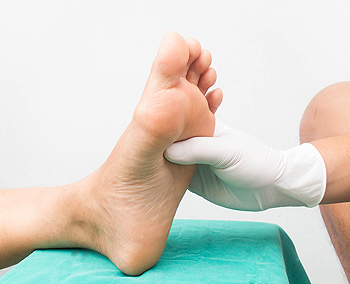
Most people who are diabetic know the importance of checking their feet daily, even when their feet feel good. Neuropathy is a common condition that can affect diabetic patients, and it is defined as being unable to feel existing cuts, bruises, or scrapes that have developed on the feet. It can happen as a result of damaged nerve endings from increased levels of insulin in the blood. Washing and drying the feet thoroughly is essential in diabetic foot care. It is suggested to refrain from walking barefoot and to wear comfortable shoes. Additionally, trimming the toenails correctly may help to prevent ingrown toenails, and engaging in a mild exercise routine can help to control blood sugar levels. If you have diabetes, it is strongly advised that you are under the care of a podiatrist who can frequently check the condition of your feet and offer you correct management techniques.
Diabetic foot care is important in preventing foot ailments such as ulcers. If you are suffering from diabetes or have any other concerns about your feet, contact the podiatrists from New England Family Foot Care. Our doctors can provide the care you need to keep you pain-free and on your feet.
Diabetic Foot Care
Diabetes affects millions of people every year. The condition can damage blood vessels in many parts of the body, especially the feet. Because of this, taking care of your feet is essential if you have diabetes, and having a podiatrist help monitor your foot health is highly recommended.
The Importance of Caring for Your Feet
- Routinely inspect your feet for bruises or sores.
- Wear socks that fit your feet comfortably.
- Wear comfortable shoes that provide adequate support.
Patients with diabetes should have their doctor monitor their blood levels, as blood sugar levels play such a huge role in diabetic care. Monitoring these levels on a regular basis is highly advised.
It is always best to inform your healthcare professional of any concerns you may have regarding your feet, especially for diabetic patients. Early treatment and routine foot examinations are keys to maintaining proper health, especially because severe complications can arise if proper treatment is not applied.
If you have any questions please feel free to contact our office located in Milton, MA . We offer the newest diagnostic and treatment technologies for all your foot and ankle needs.
Where Are Seed Corns Found?
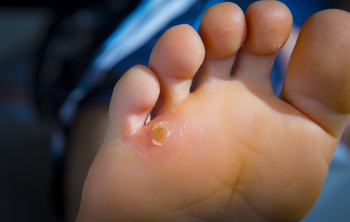
Corns can cause severe pain and discomfort. They are defined as small patches of hardened skin that develop as a result of excess friction typically from wearing shoes and socks that are too tight. There are certain medical conditions that may lead to corns. Patients who have hammertoe and bunions may find that corns develop on top of the extended joints. There are three categories of corns consisting of hard, soft, and seed corns. If you notice a corn on the bottom of your foot, it most likely is a seed corn. The medical term for this type of corn is heloma milliare and they develop due to dry skin. Other characteristics of a seed corn can include multiple corns in one area, and they may appear circular and smaller than other types of corns. Soft corns are found between the toes and remain moist from the sweat that is found there. A hard corn can develop on the side of the pinky toe or on top of the other toes from excess friction. If you have corns on your feet, please seek the expert advice of a podiatrist who can offer you the correct treatment options.
If you have any concerns regarding your feet and ankles, contact the podiatrists of New England Family Foot Care. Our doctors will treat your foot and ankle needs.
Corns: What Are They? and How Do You Get Rid of Them?
Corns can be described as areas of the skin that have thickened to the point of becoming painful or irritating. They are often layers and layers of the skin that have become dry and rough, and are normally smaller than calluses.
Ways to Prevent Corns
There are many ways to get rid of painful corns such as wearing:
- Well-fitting socks
- Comfortable shoes that are not tight around your foot
- Shoes that offer support
Treating Corns
Treatment of corns involves removing the dead skin that has built up in the specific area of the foot. Consult with Our doctors to determine the best treatment option for your case of corns.
If you have any questions please feel free to contact our office located in Milton, MA . We offer the newest diagnostic and treatment technologies for all your foot and ankle needs.
Elderly Foot Care Is Simple To Maintain
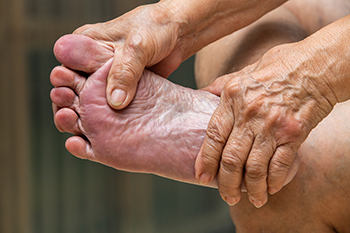
It is recommended that proper foot care is maintained as a daily habit. It is important to practice everyday foot care during the aging process, as this can help in mobility and range of motion. This is needed to enjoy walking, shopping, and generally being active. Wearing comfortable shoes is important to the overall health of the body, and it can be beneficial to alternate the shoes that are worn with a second pair. Additionally, it can help to refrain from walking barefoot, as this can prevent athlete’s foot and blisters. The shoes that are worn can help to improve balance, and decrease the risk of falling. A good time to purchase shoes is at the end of the day when the feet are at their largest, and they should feel comfortable from the moment they are tried on. Some patients wear custom made orthotics with existing medical conditions that can consist of arthritis and chronic foot ailments. Trimming the toenails correctly can possibly prevent an ingrown toenail from developing, and corns may be prevented by weaning shoes that have adequate room for the toes to move freely in. If you would like more information about the importance of maintaining elderly foot care, please consult with a podiatrist.
Proper foot care is something many older adults forget to consider. If you have any concerns about your feet and ankles, contact the podiatrists from New England Family Foot Care. Our doctors can provide the care you need to keep you pain-free and on your feet.
The Elderly and Their Feet
As we age we start to notice many changes in our body, but the elder population may not notice them right away. Medical conditions may prevent the elderly to take notice of their foot health right away. Poor vision is a lead contributor to not taking action for the elderly.
Common Conditions
- Neuropathy – can reduce feeling in the feet and can hide many life-threatening medical conditions.
- Reduced flexibility – prevents the ability of proper toenail trimming, and foot cleaning. If left untreated, it may lead to further medical issues.
- Foot sores – amongst the older population can be serious before they are discovered. Some of the problematic conditions they may face are:
- Gouging toenails affecting nearby toe
- Shoes that don’t fit properly
- Pressure sores
- Loss of circulation in legs & feet
- Edema & swelling of feet and ankles
Susceptible Infections
Diabetes and poor circulation can cause general loss of sensitivity over the years, turning a simple cut into a serious issue.
If you have any questions please feel free to contact our office located in Milton, MA . We offer the newest diagnostic and treatment technologies for all your foot and ankle needs.
Gout Pain Can Be Managed
Do I Have Plantar Fasciitis?
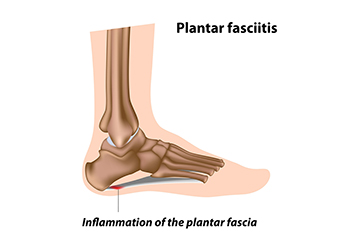
Of all the different potential sources of heel pain, plantar fasciitis is certainly one of the most common. In fact, a wide range of people are affected by this condition. Plantar fasciitis occurs when the plantar fascia becomes inflamed. The plantar fascia is a band of tissue that runs from the heel to the toes. Since plantar fasciitis can be very common, it is important to be aware of the many different typical symptoms. Commonly, those suffering from plantar fasciitis will experience some kind of pain in the heel or the arch of their foot, since the plantar fascia also supports the arch. If you notice that the pain in your heel is most pronounced in the morning when you take your first steps of the day or when you begin to walk after an extended period of rest, this could be an indicator of plantar fasciitis. If you suspect that you may have plantar fasciitis, it is suggested to contact a podiatrist as soon as possible. A podiatrist will then be able to perform a proper diagnosis by examining your feet and inquiring about your amount of regular physical activity.
Plantar fasciitis can be very painful and inconvenient. If you are experiencing heel pain or symptoms of plantar fasciitis, contact the podiatrists from New England Family Foot Care. Our doctors can provide the care you need to keep you pain-free and on your feet.
What Is Plantar Fasciitis?
Plantar fasciitis is the inflammation of the thick band of tissue that runs along the bottom of your foot, known as the plantar fascia, and causes mild to severe heel pain.
What Causes Plantar Fasciitis?
- Excessive running
- Non-supportive shoes
- Overpronation
- Repeated stretching and tearing of the plantar fascia
How Can It Be Treated?
- Conservative measures – anti-inflammatories, ice packs, stretching exercises, physical therapy, orthotic devices
- Shockwave therapy – sound waves are sent to the affected area to facilitate healing and are usually used for chronic cases of plantar fasciitis
- Surgery – usually only used as a last resort when all else fails. The plantar fascia can be surgically detached from the heel
While very treatable, plantar fasciitis is definitely not something that should be ignored. Especially in severe cases, speaking to your doctor right away is highly recommended to avoid complications and severe heel pain. Your podiatrist can work with you to provide the appropriate treatment options tailored to your condition.
If you have any questions please feel free to contact our office located in Milton, MA . We offer the newest diagnostic and treatment technologies for all your foot and ankle needs.
Why Do Ingrown Toenails Occur?
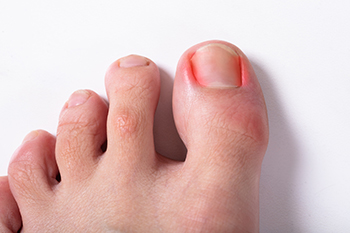
When the outer edge of the toenail pushes into the skin\ it is referred to as an ingrown toenail. Ingrown toenails are generally painful, red, and swollen, and it can be difficult to walk. In severe cases, pus may ooze from the area and will need prompt medical attention. An ingrown toenail can happen as a result of wearing shoes and socks that are too small or from trimming the toenails incorrectly. When the toenails are trimmed in a straight line the likelihood of getting an ingrown toenail may be decreased. Diabetic patients may benefit from maintaining proper foot health and this can help to prevent ingrown toenails from developing. Mild relief may be found when the foot is soaked in warm water followed by gently pulling the skin away from the toe using a piece of cotton. This is generally a temporary fix and it is advised to contact a podiatrist who can perform surgery for permanent relief.
Ingrown toenails can become painful if they are not treated properly. For more information about ingrown toenails, contact the podiatrists of New England Family Foot Care. Our doctors can provide the care you need to keep you pain-free and on your feet.
Ingrown Toenails
Ingrown toenails occur when a toenail grows sideways into the bed of the nail, causing pain, swelling, and possibly infection.
Causes
- Bacterial infections
- Improper nail cutting such as cutting it too short or not straight across
- Trauma to the toe, such as stubbing, which causes the nail to grow back irregularly
- Ill-fitting shoes that bunch the toes too close together
- Genetic predisposition
Prevention
Because ingrown toenails are not something found outside of shoe-wearing cultures, going barefoot as often as possible will decrease the likeliness of developing ingrown toenails. Wearing proper fitting shoes and using proper cutting techniques will also help decrease your risk of developing ingrown toenails.
Treatment
Ingrown toenails are a very treatable foot condition. In minor cases, soaking the affected area in salt or antibacterial soaps will not only help with the ingrown nail itself, but also help prevent any infections from occurring. In more severe cases, surgery is an option. In either case, speaking to your podiatrist about this condition will help you get a better understanding of specific treatment options that are right for you.
If you have any questions please feel free to contact our office located in Milton, MA . We offer the newest diagnostic and treatment technologies for all your foot and ankle needs.





